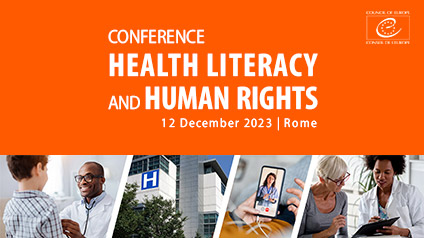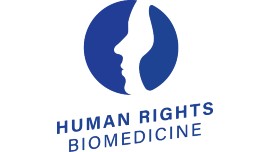Conference on Health Literacy and Human Rights
Trust building and equitable access to healthcare

Health literacy makes a fundamentally important contribution to safeguarding the human rights principle of equitable access to healthcare, especially when existing healthcare resources are less accessible to certain populations due to their circumstances.
The Conference “Health literacy and human rights – trust building and equitable access to healthcare” was organised by the Council of Europe in cooperation with the National Office Against Racial Discrimination of Italy, and with the support of the Ministry of Family, Natality & Equal Opportunities and of the Ministry of Health of Italy
What is health literacy and why is it important ?
Stephan Van den BROUCKE,
Professor of Health Psychology, Catholic University, Belgium
Why is the Council of Europe conference important for the National Office against Racial Discrimination of Italy?
Mattia PERADOTTO,
Director General, National Office Against Racial Discrimination (UNAR), Italy
What was the main outcome of the Council of Europe conference ?
Kristine SØRENSEN,
Global Health Literacy Academy, Denmark

 “We need strong health literacy skills so people can fully read and understand health information and make informed decisions, where needed. This is best achieved by health services using literacy friendly approaches such as using plain language.”
“We need strong health literacy skills so people can fully read and understand health information and make informed decisions, where needed. This is best achieved by health services using literacy friendly approaches such as using plain language.”
Helen RYAN, Health Lead in Adult Literacy for Life Programme Office, Department of Further and Higher Education, Research, Innovation and Science, Ireland

 “The Council of Europe Guide to health literacy fosters evidence-informed policy making and practice to support equitable access to health care. As an informative resource with actionable good practices, the Guide supports the responsiveness of health systems’ in adressing the needs of everyone seeking treatment and care.”
“The Council of Europe Guide to health literacy fosters evidence-informed policy making and practice to support equitable access to health care. As an informative resource with actionable good practices, the Guide supports the responsiveness of health systems’ in adressing the needs of everyone seeking treatment and care.”
Leena PAAKKARI, Associate professor, University of Jyväskylä, Finland

 "As telemedicine becomes more common, doctors need to rely more on patients to measure, for instance, their heart rates or body temperatures themselves, at home without a healthcare professional present. Patients understanding the importance of such data and how it relates to their disease is therefore increasingly more important, not only for their self care but also for doctors who keep track of patients remotely."
"As telemedicine becomes more common, doctors need to rely more on patients to measure, for instance, their heart rates or body temperatures themselves, at home without a healthcare professional present. Patients understanding the importance of such data and how it relates to their disease is therefore increasingly more important, not only for their self care but also for doctors who keep track of patients remotely."
Kristof VANFRAECHEM, Founder and CEO, Data for Patients, Spain










